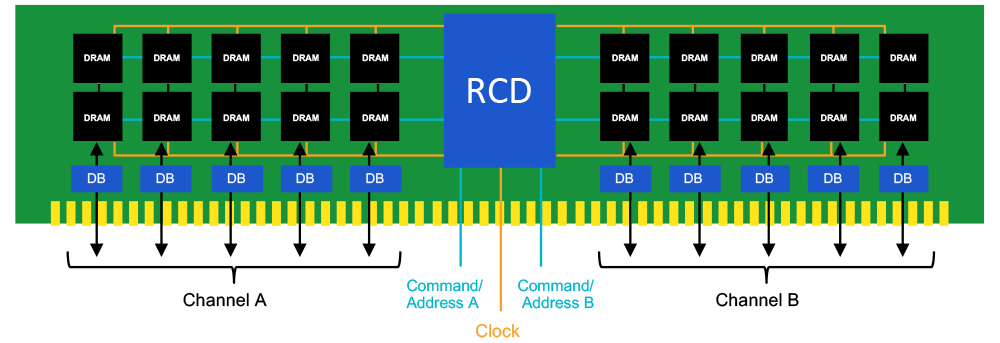Rambus' RCD Chip Enables DDR5-5600 for Next-Gen Servers
Faster DDR5 RDIMMs incoming.
Rambus has introduced its 2nd generation registering clock driver (RCD) chip for DDR5 memory, a key component that will enable memory module makers to build registered DDR5 modules with an up to 5600 MT/s data transfer rate for next-generation servers.
Rambus already has its 1st generation RCD for DDR5-4800 RDIMMs that will power upcoming servers based on Intel's 4th Generation Xeon Scalable 'Sapphire Rapids' and other DDR5-supporting CPUs. The company's 2nd generation RCD will be used for RDIMM and LRDIMM modules aimed at next-generation machines that will support DDR5-5600 memory.
An RCD is a buffer that sits between memory controller and DRAM ICs and redistributes the command / address signals within the module to improve the signal integrity and connect more memory devices to one DRAM channel. Since RCD is a buffer, it naturally extends latencies. The RCD needs to support a very specific data transfer rate to work properly, so Rambus' 2nd generation DDR5 RCD is indeed aimed at subsystems supporting a 5600 MT/s data transfer rate.
Rambus says that its 2nd Generation DDR5 RCD not only delivers a 17% higher peak bandwidth, but does so at optimized latencies to boost real-world RDIMM performance as well as at lower power.
"The RCD is a mission-critical enabler of DDR5 server DIMMs that provide the bandwidth and capacity needed in next-generation data centers," said Sean Fan, chief operating officer at Rambus. "Achieving the 5600 MT/s data rate is the latest demonstration of our continued leadership in DDR5 memory interface products."
Rambus' 2nd Generation RCD is now available for designers of memory modules. At present it is unclear when appropriate DDR5-5600 RDIMMs and LRDIMMs will be available, but it is reasonable to expect them to hit the market when servers supporting 5600 MT/s memory ship.
Get Tom's Hardware's best news and in-depth reviews, straight to your inbox.

Anton Shilov is a contributing writer at Tom’s Hardware. Over the past couple of decades, he has covered everything from CPUs and GPUs to supercomputers and from modern process technologies and latest fab tools to high-tech industry trends.
-
King_V I was shocked to find Rambus still existed. Given their claims that they owned SDRAM and DDR, their patent-troll style behavior, evidence-shredding, and overall bad faith participation in JEDEC, I can't believe they are still around.Reply
